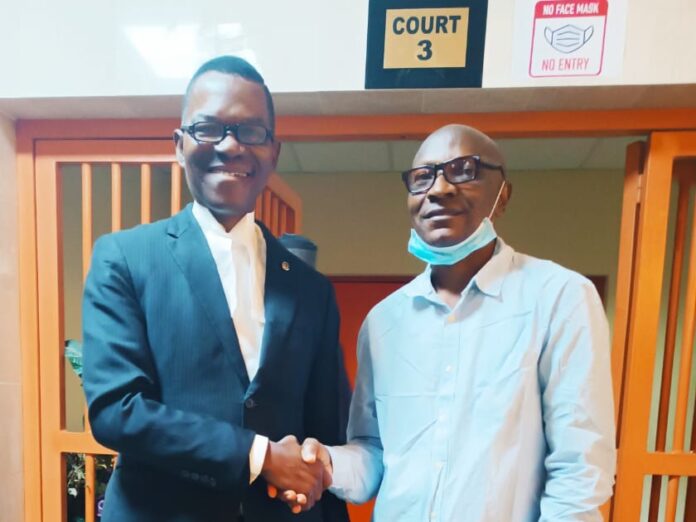Mr Charles Umukoro, (right) with his lead lawyer, Sir Peter Odion Aihiokhai, after his acquittal.
Abasifreke Effiong
Six years and eight months after the demise of Mrs. Louisa Eni Umukoro, Hon. Justice Maryann Anenih, of High Court 3, Maitama, Abuja, has absolved discharged Mr Charles Umukoro, husband of the deceased of murder of his wife.
He was arrested on 25th May 2016 over the death of his wife.
Mr Umokoro was accused of murdering Louisa, who died on the 21st April 2016 at the National hospital, Abuja and was charged for culpable Homicide punishable with death under section 221 of the Penal code.
Umokoro was arraigned by the police based a petition to the Inspector General of Police by the siblings of the deceased who complained that Louisa’s demise was “sudden and unnatural”.
The prosecution counsel claimed that Louisa (Charle’s wife) died of massive subdural hemorrhage as a result of domestic violence caused by his husband.
Court documents available to The Dune indicate that the siblings of the deceased caused an autopsy to be carried out on the remains of Louisa, and she was said to have died of subdural haemorrhage and android uterine fibroid.
The prosecution called eight witnesses including the police IPO, the pathologist, and siblings of the deceased.
READ: More groups call on Governors in Niger Delta to sign Open Government Partnership
The defendant, Charles Umukoro, testified in his own defence without calling any witness, he stated that he married the deceased under the marriage Act sometime in in July 2005, saying he “loved his wife and could not have killed her.”
He said his deceased wife had underlying health issues due to fibroid and she was introduced to healthcare expert at Diff Hospital, Garki, Abuja, where her condition was managed.
According to him, “the deceased was equally managing goitre and high blood pressure.”
The defendant stated that PW1 (Nosakhare Ukponmwan) and PW8 (Isoken Ukponmwan) were falling head over heels because of the deceased assets.
He told the court that before his arrest, Nosakhare Ukponmwan had called for a meeting with him to decide on the deceased’s assets and custody of the only child of the marriage (a son), adding that Ukponmwan thereafter told him to hands off the deceased’s properties including the ones jointly owned by him and the deceased because they believed he will marry another wife and use the wealth to take care of her.
He said that it was because he refused to sign off the properties that led to the instant trial before the court, adding that the siblings of the deceased obtained probate letters of administration over the properties of the deceased and others jointly acquired by him and the deceased while he was in custody.
Counsel to the defendant led by Sir Peter Odion Aihiokhai, in his sole issue asked the Court to determine whether the prosecution has met the three ingredients which must be proved to secure a conviction for the offence of culpable homicide punishable by death under section 221 of the Penal Code.
Aihiokhai submitted that the testimonies of the prosecution witnesses are hearsay regarding events that allegedly took place long before the deceased’s death and that the circumstantial evidence given by the prosecution is mere circumstances of suspicion.
He said that PW3 admitted that the subdural haemorrhage can be caused by a crash, fall or violent attack, insisting that to secure conviction on circumstantial evidence in a case of culpable homicide, such circumstantial evidence must be cogent, complete and unequivocal pointing to the conclusion that the accused person and no one else committed the homicide.
READ ALSO: Delta state Magistrate remands woman for contempt without charge, victim writes JSC
The prosecution counsel led by J.S. Okutepa, SAN, insisted that the essential ingredients of the offence punishable under section 221 of the Penal Code have been proved, submitting that the defendant killed the deceased.
He posited that the deceased was the defendant’s punching bag and the beatings caused her death.
The court in her judgment held that the prosecution failed to prove beyond reasonable doubt that it was the act of the defendant that caused the deceased’s death.
In a judgment delivered on 6th December, Justice Anenih said; ” Where the prosecution fails to adduce evidence sufficient to establish the guilt of the defendant, the court would under such circumstance have no option than to absolve him of guilt. The intention of the courts in such situations is not to allow criminals go unpunished but rather to ensure as much as possible that the innocent is not convicted. This is in line with the time honoured principle that it is better that ten guilty persons escape justice than for one innocent man to be punished for an offence he did not commit”
The court relying on provisions of section 309 of the Administration of Criminal Justice Act (2015) found the defendant not “guilty” of the offence of culpable Homicide punishable with death for which he was charged under section 221 of the Penal Code and he was accordingly discharged and acquitted.
















